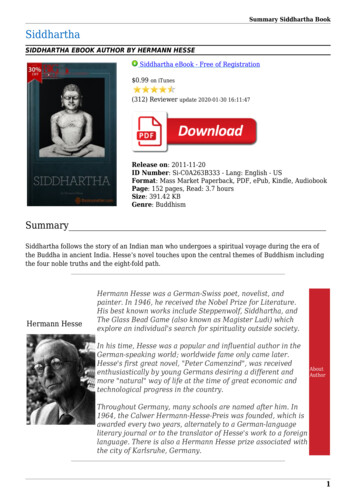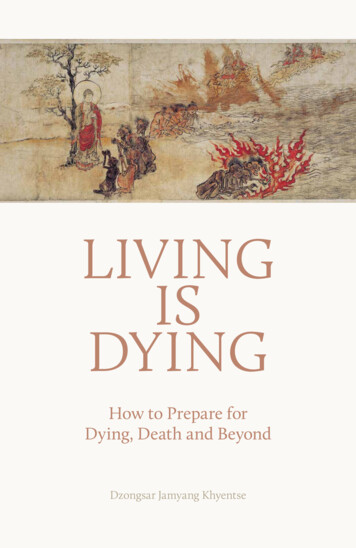
Transcription
Continue
Siddhartha pdf bookSiddhartha Project Gutenberg EBook, Herman Hesse this eBook is for use by everyone anywhere at no cost and with almost no restrictions. You can copy it, give it to someone else, or reus it online under the terms of the Project Gutenberg License contained in this eBook or in the www.gutenberg.org Title: Siddhartha Author: HermanHesse Translator: Gunther Olesch, Anke Dreher, Amy Coulter, Stefan Langer and Semyon Chaichenets Release Date: April 6, 2008 [EBook #2500] Last Updated: February 6, 2019 Last updated: July 2, 2011 Last updated: 2 July 2011 January 23, 2013 Language: English Character set coding: ISO-8859-1 *** START THISPROJEGUTENBERG EBOOK SIDDHARTHA *** Michael Pullen, Chandra Yenco, Isaac Jones grew up in the shadow of the house, boats in the shade of the fig tree, in the shade of the fig tree, Siddhartha where Brahman's handsome son , the young hawk, along with his friend Govinda, is the son of a Brahman. While bathing, bathing,performing sacred ablutions, sacred islands, the light tanned its shoulders on the banks of the river. In the mango grove, the shadow poured into his black eyes, playing as a child, when his mother sang, when sacred deeds were made, when his father, sycthing, wise men spoke, taught him. For a long time, Siddhartha had been practicingdiscussion with Govinda, practicing the art of reflection, meditation service, by participating in discussions of wise men. He already knew how to speak Om quietly, the word of words, talking quietly into him as he breathed, talking quietly as he breathed, with all the concentration of his soul, with his onset beset by the glow of an openminded soul. He already knew how to feel Atman, indestructible, one with the universe, indestructible, deep in his edos. Joy jumped into his father's heart for his knowledge-thirsty son, who was quick to learn; He saw that he grew up to be the great wise man and priest, a prince among the brahmans. Bliss leapt on her mother's chest whenshe saw him walking, and when she saw him sit down and get up, Siddhartha, strong, handsome, greeted him with perfect respect, as he was walking on thin legs. Love touched the hearts of the Brahmans' young girls when Siddhartha walked through the city's lanes with his shiny arm, a king's eye, thin hips. But more than any other, hewas loved by his friend, Govinda, the son of a Brahman. He loved Siddhartha's eye and sweet voice, he loved his walk and the perfect manners of his movements, he loved everything Siddhartha did and said, and his favorite thing was his soul, his love, his fiery thoughts, his fiery will, his high calls. Govinda knew: he would not be acommon Brahman, not a lazy official in charge of bids; not a greedy merchant with magic magic; not in vain, but an empty speaker; not an average, priest; and also not a good, stupid sheep in many herds. No, he, Govinda, he didn't want to be one of them, he didn't want to be one of tens of thousands of Brahmans. He wanted to followSiddhartha. And in the days to come, when Siddhartha became god, when he would join the majestic, Govinda wanted to follow him as his friend, friend, servant, spear bearer, shadow. Siddhartha was thus loved by all. He was a source of joy for everyone, he was a pleasure for all of them. But he, Siddhartha, was not a source of joy forhimself, he found no pleasure in himself. Walking the pink roads of the fig tree garden, sitting in the bluelier shade of the contemplation garden, washing limbs every day in the bath of repentance, sacricing in the dim shade of the mango forest, perfect gestures of morality, everyone's love and joy, still lacked all the joy in your heart.Dreams and restless thoughts came to his mind, flowing from the water of the river, shining from the stars of the night, melting from the sun's rafters, dreams came to him, and the restlessness of the soul, the smoke from the victims, breathing through rig-veda's verses, instilling in him, drip-drip, from the teachings of the ancient Brahmans.Siddhartha had begun to nurse discontent in her own right, she was beginning to feel her father's love and her mother's love, and also her friend, Govinda's love, would not bring her joy forever, breastfeed her, feed her, satisfy her. Since his esteemed father and other teachers had already revealed to him the best and wisdom of thewisdom of the wise Brahmans, they filled his expected vein with riches and the ship was not full, the soul was not satisfied, the soul was not calm, the heart was not satisfied. Ablutions were good, but when they were in the water, they did not wet the sin, they did not heal the thirst of the soul, they did not relieve fear in the heart. Thesacrifices of the gods and the calling were perfect, but that was it? The victims gave you a happy fortune? What about the gods? Did prajapathy really create the world? Wasn't it Atman, the one, only one? Aren't the gods creations, created like me and you, time-goers, mortals? So was it good, was it true, was it meaningful, and was it thehighest profession to make a deed to the gods? Who else was made to do presentations, but who else would be worshipped, one person, Atman? And where would Atman be found, where did he reside, where was his eternal heartbeat, where else, in his own self, in the inner most part, in the indestructible part where everyone was inhimself? But where was it, where was this me, this is the inner most in-house part, this is the final part? It wasn't flesh and bone, neither thought nor consciousness, so the wise ones taught. Where was he, where was he? To get here, me, me, Atman, there was another way, which was worth looking for? Unfortunately, and no one showedit that way, no one knew, not the father, nor the teachers and wise men, not the songs of the holy sacrifice! They knew everything, the Brahmans and the scriptures, they knew everything, more than anything, with the creation of the world, the speech, the food, the breathing, the breathing, the arrangement of the senses, the actions of thegods, they knew endlessly.but it was valuable to know all of this. , this is the only thing, the most important thing, just not knowing anything important? Certainly, many verses of scriptures, especially in Samaveda's Upanishades, mentioned this most indial and greatest thing, wonderful verses. It was written there that the soul had beenwritten there all over the world, and it was written in his sleep, in his deep sleep, that he would meet his deepest part and that he would reside in Atman. In these verses of magnificent wisdom, all the knowledge of the wisest is gathered here in magic words, pure as honey collected by bees. No, it was an enormous amount ofenlightenment collected and preserved here by countless generations of wise Brahmans.— But where were the brahmen, where were the priests, the wise men or the penitrating, who had managed not only to know the deepest of this knowledge, but also to live? Where was the knowledgeable person who cast his spell to put hisfamiliarity with Atman from sleep to wakefulness, to life, every step of the way, to words and deeds? Siddhartha knew many venerable Brahmans, especially his father, a naïve, syc at one of the most respected. His father lived behind the eyebrow of his manners, pure life, wise, delicate and noble thoughts to be admired - but even if he,who knew so much, did he live happily ever after, he had peace, and he was not just a searching man, a thirsty man? Over and over again, as a thirsty man, didn't he have to drink from the deeds, the books, the disagreements of the Brahmans? Why does he, who is irresponsible, have to clean up the sins every day, strive for a cleansingevery day, over and over again every day? He didn't have Atman. It had to be found, the pristine resource in its own self, must be captured! Everything else was being searched, it was a deviation, it was disappearing. So siddhartha had thoughts, it was his thirst, it was his pain. Often a Chandogya-Upanishad said to himself the followingwords: Indeed, brahman's name satyam-verily, those who know such a thing, will enter the world of heaven every day. Most of the time, it seemed close, the heavenly world, but he had never fully reached it, he never extinguished the ultimate thirst. And all wise and in between Men, he knew and who received instructions, there was noone among them, who had reached out completely, the heavenly world, who had completely extinguished, eternal thirst. Govinda, Siddhartha's friend spoke, Govinda, dear, come with me under the Banyan tree, let's meditate. They went to the Banyan tree, they sat down, Siddhartha is right here, Govinda is 20 steps away. As he puthimself on the ground, Om was ready to speak, Siddhartha repeated the verse muttering: Om bow, arrow spirit, Brahman arrow target, this one must hit constantly. After passing the usual time of meditation exercise, Govinda rose. It was evening, it was time to ablution the evening. He said Siddhartha's name. Siddhartha didn't answer.Siddhartha sat there lost in thought, his eyes focused hard towards a goal too far, the tip of his tongue was protruding a bit between the teeth, he seemed not to breathe. So when he sat down, wrapped in contemplation, Om sent his soul after Brahman as an arrow, thinking. Once, Samanas had traveled with a pilgrimage ordeal,surrounded by a pilgrimage, three skinny, faded men, what old and bloody shoulders, almost naked, roasted by the sun, lank in the land of loneliness, aliens and enemies to the world, aliens and people. Behind them a quiet passion, destructive service, relentless self-denial blew a warm scent. In the evening, after contemplation,Siddhartha spoke to Govinda: Early tomorrow morning, my friend Siddhartha will go to Samanas. She's going to be a Samana. Govinda turned pale, she heard those words and read the decision on her friend's still face, unstoppable as she shot the arrow from the bow. Soon and at first glance, Govinda realizes: Now that it's starting, nowSiddhartha is taking her own path, now her fate is beginning to sprout, and with her, mine. And it pales like a dry banana skin. O Siddhartha, he yelled, will your father let you do this? Siddhartha looked at me like she was just waking up. He read in Govinda's soul at arrow speed, read fear, read surrender. O Govinda, he spoke quietly, let'snot waste words. Tomorrow, in the day, I'll begin the life of the Samana. Don't talk any more. Siddhartha walked into the room where his father was sitting on a cane and stood behind his father and stood there, until his father felt someone standing behind him. Brahman Quote: Is it you, Siddhartha? Then tell him you're here to tell me.Quoth Siddhartha: Excuse me, my father. I came to tell you that it's my longing to leave your house tomorrow and go to the ordeal. My desire is to be a Samana. Don't let my father go against it. Brahman remained silent and silent for so long that the stars in the small window moved around and changed relatives. The silence is broken.Quiet and still arms folded, the quiet and still petite father sat and stopped his son as the stars followed their paths in the sky. Then the father spoke: It is not right for a Brahman to say harsh and angry words. But anger is in my heart. I don't want to hear that second time. Gradually, Brahman rose; Siddhartha stood silently, his arms curled.What are you waiting for? He asked, Dad. Quoth Siddhartha: You know what? Angry, the father left the room; Angry, she went to bed and lay down. An hour later, since no sleep had come over his eyes, Brahman stood up, paced and fro, and left the house. He looked back through the room's small window and saw Siddhartha standing,his arms curled up, not moving. She flashed her pale shiny bathrobe. With anxiety in his heart, the father returned to bed. An hour later, since no sleep had come over his eyes, Brahman stood up again, paced and fro, left the house and saw the moon rise. He looked back from the window of the room; There Siddhartha stood, not movingfrom his place, his arms folded, reflecting his naked shins in the moonlight. With anxiety in his heart, the father went back to bed. And an hour later he came back, two hours later he came back, he looked out the little window, he saw Siddhartha standing, in the moonlight, in the light of the stars, in the dark. And he came back every hour,looked quietly into the room, saw him standing in the same place, filled his heart with anger, filled his heart with restlessness, filled his heart with anguish, filled it with sadness. And in the last hour of the night, before the day began, he came back, walked into the room, saw the young man standing there, tall and looking like a stranger tohim. Siddhartha said, what are you waiting for? Do you know? You're always going to stand there and wait until morning, noon and evening? I'll stop and wait. You'll get tired, Siddhartha. I'm going to get tired. You're going to fall asleep, Siddhartha. I won't be able to sleep. You're going to die, Siddhartha. Die. Would you rather die thanobey your father? Siddhartha has always obeyed his father. Are you going to abandon your plan? Siddhartha will do what her father tells her to do. The first light of the day shone into the room. Brahman saw Siddhartha trembling slightly on his knees. Siddhartha didn't see any tremors on his face, his eyes pinned to a remote place. Thenhis father realized siddhartha no longer lived with him in his home. The father touched Siddhartha's shoulder. You will, he said, go into the woods and become a Samana. When you find happiness in the woods, come back and teach me to be happy. If you find frustration, then go back and let us make deeds to the gods together again.Now go kiss your mother and tell me where you're going. But it's time for me to go to the river and make the first ablution. He took his hand off his son's shoulder and went outside. Siddhartha shook aside trying to walk. He had his limbs back under control, bowed to his father and went to his mother to do what his father said. As hegradually left the still quiet town on hard legs at first light of the day, he rose to a near shadow of the last hut, where he had crouched, and joined the pilgrim-Govinda. You came, Siddhartha said, and he smiled. I'm here, Govinda said. SAMANAS İlE On the evening of this day, they caught up with the ordeal, the skinny Samanas, andoffered them their friendship and obedience. They've been accepted. Siddhartha gave his clothes to poor Brahman on the street. It was to wear nothing but a pee and a dirt-colored, unsown cape. He only ate once a day and never did anything cooked. He fasted for 15 days. He fasted for 28 days. The flesh faded from her hips andcheeks. Fiery dreams flickered through his enlarged eyes, long nails grew slowly as his parched fingers and dry, furry beard grew on his chin. When he met the women, his gaze turned to dust; Walking through a city with twitchy, beautifully dressed people with contempt. He saw merchants trading, princes hunting, mourners wailing fortheir dead, oryaks offering themselves, doctors trying to help patients, priests who set the best day for seeding, loved lovers, mothers breastfeededing their children, and all of this was not worthy of a single look through his eyes, they all lied, they all smelled of lies, they all acted as meaningful and cheerful and beautiful. And it was all justsecret putrefaction. The world tastes bitter. Life was torture. One goal Siddhartha stood in front of one goal: to be empty, thirst empty, wish blank, dreams empty, joy and grief empty. It was his goal to find himself dead, no longer a self, to find peace with an empty heart, to be open to miracles with unsym selfish thoughts. Once I hadovercome my entire own and had died, once every desire and every urge was silent in the heart, then I had to wake up to my ultimate part, the inner most of my being, no longer my myself, the great secret. Quietly, Siddhartha exposed directly above the sun's blazing rays, glowing with pain, glowing with thirst, and stood there, so much sothat neither any pain nor thirst felt anymore. Quietly, during the rainy season stood there, the water from his hair was dripping over freezing shoulders, on freezing hips and legs, and the repentance stood there, he couldn't feel so much cold on his shoulders and legs, until they were quiet, until they were quiet. Quietly, in spiky bushes,blood dripping from burning skin, pus-dripping wounds and He stayed solid, immobilized, until the blood flowed, until nothing was stung, until nothing was on the side. Siddhartha sat upright and learned to breathe infrequently, learned to get by with just a few breaths, learned to stop breathing. Starting with the breath, he learned that hisheart was leaning towards reducing his heart's shot to calm his shot. Trained by the oldest samana, Siddhartha practices self-denial, meditation, according to the new Samana rules. A herder flew over the bamboo forest and accepted herders into the spirit of Siddhartha, flew over forests and mountains, ate fish, felt the throes of afisherman's stare, spoke of the fisherman's croak, a herder died. He lay on a dead sandy shore and Siddhartha's soul slipped inside the body, dead banged, lay on the shores, swollen, swollen, rotten, torn apart by hyaenas, skinned by vultures, turned into skeletons, turned to dust, blown into fields. And Siddhartha's soul returned, dead,rotting, scattered like dust, tasting the gloomy drunkenness of the cycle, waiting with new thirst like a hunter in space. He killed his senses, he killed his memory, he turned into thousands of other form, he was an animal, he was overflowing, he was wood, he was water, and every time he woke up, he found himself again, the sun or themoon, he found himself again, he turned in the cycle, he felt thirst, he exceeded thirst, he felt thirst, he felt thirst new. Siddhartha learned a lot when she was with the Samana. He crossed the path of self-denial with pain, self-consent, pain, hunger, thirst, exhaustion. Imagining that the mind lacked all concepts, he went down the path ofself-denial through meditation. He learned to go through this and other ways, left himself a thousand times, was without me for hours and days. But while the paths may have led away from the self, their end nevertheless always led to self-reliance. Although Siddhartha had run away from himself a thousand times, remained innothingness, remained in the animal, the return was inevitable, inevitable, the hour when he found himself in daylight or moonlight, in the shade or rain, and once again he was his own self and Siddhartha, and again he felt the pain of the cycle that forced him. He lived next to Govinda, his shadow, walked the same paths, undertook thesame efforts. They rarely served and spoke to each other, more than the necessary exercises. Occasionally the two of them went around the villages begging for food for themselves and their teachers. How do you think, Govinda, siddhartha spoke one day while begging like this, how do you think of progress? Us? any goals? Govindareplied: We've learned, and we'll keep learning. You're going to make a great Samana, Siddhartha. Quickly, i learned every exercise, usually the old Samanalar admire you. One day, you'll be a holy man, oh Siddhartha. Quoth Siddhartha: I can't help but feel like this isn't the case, man. Since I'm among the Samana, until today, this, ohGovinda, I could learn in faster and simpler ways. I could find out about it in every tavern in that part of a town, where there were waiters, among my friend, carters and gamblers. Quoth Govinda: Siddhartha places me. How did you learn to meditate, to hold your breath, to be insensitive to staration and pain among these wretched people?And Siddhartha quietly said, as if he were talking to himself: What is meditation? What leaves someone's body? What is fasting? What's holding your breath? It is a brief escape from the agony of being a self, escaping from self, it is a brief numbing of the senses against the pain and meaninglessness of life. In the same escape, an ox cartdriver of the same short numbing finds the inn drinking several bowls of rice-wine or fermented coconut milk. Then he won't feel himself anymore, then he won't feel the pain of life, then he'll find that the senses are a short numbing. When she fall asleep on rice wine, she'll find the same thing Siddhartha and Govinda found when they ranaway from their bodies with long exercises. That's it, oh Govinda. Quoth Govinda: You say so, oh friend, and yet you know siddhartha is an ox cart driver and a Samana is no drunk. It's true that a drinker can numb his senses, it's true that he briefly escaped and rested, but he'll come back from delusion, where everything is unchanged,he's not smarter, he hasn't collected any enlightenment, he hasn't taken a few steps. And Siddhartha spoke with a smile: I don't know, I've never been a drunk. But I, Siddhartha, know that in my exercises and meditations, the senses are only briefly numb, and as a child in your mother's womb, from my wisdom, salvation, oh Govinda, Iknow that. And once again, another time, when Siddhartha left the woods with Govinda to beg for some food in the village for her brothers and teachers, Siddhartha started talking and said: Now, oh Govinda, can we be on the right track? Can we get closer to enlightenment? Can we get closer to salvation? Or do we live in a circle? QuothGovinda: We learned a lot, Siddhartha, there's still a lot to learn. We're not going in circles, we're going up, the circle is a spiral, we've already risen too much. Siddhartha replied: How old do you think, our oldest Samana, is our esteemed teacher? Quoth Govinda: It may be about our oldest age, he said. And Siddhartha: He has lived forsixty years and has not reached nirvana. He's going to be seventy-eighty, and you and I are going to grow old the same way, and we're going to do our exercises, fast, and meditate. But we're not going to get to nirvana, he's not going to get there, and we're not going to. Oh Govinda, I believe every Samana there will reach nirvana. Wefind comfort, we find drowsiness, we learn heroism, we deceive other people. But the most important thing is that we won't find our way. If you just spoke to Govinda, you wouldn't talk such horrible words, Siddhartha! How is it that among so many brahmans, among so many brahmans, among so many plain and venerable Samana,among so many who seek, those who eagerly strive, so many holy men, no one can find their way out of the way? But Siddhartha said in a voice of sadness, quiet, a little sad, a little sarcastic: Soon, Govinda will leave the path of your friend Samanas, she walked along side you for so long. I'm suffering from thirst, oh Govinda, and on thislong road to a Samana, my thirst has remained as strong as ever. I've always been thirsty for information, always full of questions. I asked the Brahmans every year and asked the holy Farewells, every year, and every year I asked devoteE Samanas. Perhaps, oh Govinda, who had been equally good, had I asked hornbill-bird orchimpanzee, as smart and the same had become profitable. It took me a long time and i haven't finished learning this yet, oh Govinda: there's nothing to learn! There really is no such thing, so I believe, as we call 'learning'. There's one thing, man, it's just information, it's everywhere, it's Atman, it's inside me, it's in you, and it's in everycreature. And I'm beginning to believe that knowledge has no worse enemy than a desire to learn. At this moment, Govinda stopped on the road, opened her hands and spoke: If you, Siddhartha, just wouldn't bother your friend with this kind of conversation! Really, you words inspire fear in my heart. And just think: what happens to thesanctity of prayer, what brahmans' caste and tuberculosis, what is the sanctity of Samanas, if you had no learning?! What, oh Siddhartha, then all this happens is sacred, what is precious, what is venerable on earth?! And Govinda muttered a verse to herself, a verse from an Upanishad: She is a purified soul, loses herself in atmanmeditation, her heart is her happiness that cannot be expressed in words. But Siddhartha kept quiet. He thought about what Govinda said to him and thought about his words to the end. yes, he stood there with his head low and thought, What's left of us that looks sacred? What What can withstand the test? And he nodded. Once upon atime, two young men lived among the hays for nearly three years and shared their exercises, some news, a rumor, a legend had reached them after being told many times: a man had appeared, by the name of Gotama, the almighty, the Buda, had overcome the pain of the world in his own right and stopped the cycle of rebirth. He is saidto be an ordeal yellow cape, without having land, teaching, surrounded by disciples, without having, but a cheerful eyebrow, a man of happiness, and brahmans and princes bow before him and his disciples will. This myth, this rumor, echoed this myth, rose to its fragrants, here and there; In towns, the Brahmans talked about it and theSamana in the forest; Over and over again, gotama's name, The Buda reached the ears of young men, with good and bad speech, with praise and slander. It was as if the plague had erupted in a country and the news was spreading around, there was a man, a wise man, a knowledgeable man. There would be many doubts, manydoubts, but many would get their way as soon as possible, to call the wise man, help, ran this myth land like this, this fragrant legend of Gotama, the Buda, the wise man of the Sakya family. He said that having, so the believers, the highest enlightenment, remembered his previous lives, he had reached nirvana and did not return into theloop, never flooded the dark river of physical forms again. Many beautiful and incredible things had been reported about him, he had performed miracles, he had overcome the devil, he had spoken to the gods. But his enemies and deneers, who said that Gotama was seductive in vain, he spent his days in luxury, scorned the offerings,without learning, and knew neither exercises nor self-castigation. The legend of the bus sounds good. The smell of magic flowed through these reports. After all, the world was sick, life was hard to bear-and-know, here was a source forward like spring, where a messenger seemed to call out, relaxing, light, full of noble promises. Whereverthe rumor of the Buda was heard, all over the indian territory, young people heard and felt a longing, hope, and among the sons of the Brahmans, every pilgrim and stranger was welcomed in towns and villages, sakyamuni, who was great when he brought news of him. The legend had reached Samana and siddhartha in the forest, as wellas Govinda. They rarely talked about it, because the oldest of the Samana didn't like this myth. He used to have heard of this so-called Buddha I lived before and in the woods, but then i had returned to luxury and earthly pleasures and she had no high opinion of this Gotama. Oh Siddhartha, Govinda spoke to her friend one day. Today, Iwas in the village and a Brahman invited me to his house and he had the son of a Brahman from Magadha. Verily, it hurt my chest when I breathed, and I thought to myself: I wish I could live to see the clock, if only we both, Siddhartha and I, would hear the teachings from the mouth of this perfect man! Talk, man, wouldn't we want to goover there and hear the teachings from Buddha's mouth? Quoth Siddhartha: Always, oh Govinda, I thought, I would stay with Govinda Samanas, always believed that her goal was to live sixty and seventy years old and continue practicing these feats and exercises, which are becoming a Samana. But look, I didn't know Govinda wellenough, I knew very little about her heart. Now you, my loyal friend, want to take a new path and go there, where Buddha spreads his teachings. Quoth Govinda: You're kidding me. Make fun of me if you want, Siddhartha! But it's also a desire to hear these teachings, a whim, isn't it? Didn't you once tell me you wouldn't walk the Samana'spath any further? At this moment, Siddhartha laughed in his own way, in which his voice accepted a touch of sadness and a touch of ridicule, and said: Well, Govinda, you spoke well, remembered correctly. If you've only remembered the other thing, you've heard it from me, that I've become insecure and tired of teachings and learning,and that I have little faith in the words that are brought to us by teachers. But let's do it, dear, I'm ready to hear these teachings, but I believe in my heart that we've tasted the best fruit of these teachings. Quoth Govinda: Your willingness delights my heart. But tell me, how is that possible? How should Gotama's teachings offer us their bestfruit, even before we hear them? Quoth Siddhartha: Eat us this fruit and wait for the rest, oh Govinda! But thanks to gotama, this fruit we bought was made up of him dingying us away from the Samana! Let's have something else and better to give us, uh, man, let's wait with calm hearts. On the same day, Siddhartha announced that theoldest of the Samana had decided that he wanted to leave her. He informed the oldest, with all kindness and humility, by turning into a younger student and a student. But Samana got angry because two young men wanted to leave her, spoke loudly and used vulgar profanity. Govinda was timtudeed and embarrassed. But Siddhartha puthis mouth in Govinda's ear and whispered to her: Now, I want to show it to the old man. He learned something from her. In front of Samana, closely positioning himself with a concentrated spirit, he caught the old man's gaze with his gaze, deprived him of his power, made him mute, stripped him of his free will, restrained him under his will,ordered him to do it quietly, whatever he wanted him to do. The old man was mute, his eyes were still, his will was paralyzed, his arms were hanging down; Without po
Siddhartha pdf book Siddhartha Project Gutenberg EBook, Herman Hesse this eBook is for use by everyone anywhere at no cost and with almost no restrictions. You can copy it, give it to someone else, or reus it online under the terms of the Project Gutenberg License contained in this eBook or in the www.gutenberg.org Title: Siddhartha Author .










